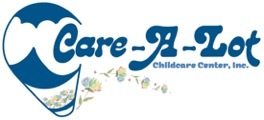Child Care
Frequently Asked Questions
Care-a-Lot knows that childcare looks different for everyone. We have answers to your questions!
What are your hours of operation?
Hours of operation vary by location. Please see our locations page for hours of operation.
What ages do you accommodate?
Care-A-Lot accepts children ages 0-11 in our programs. Please contact the location you are interested in for availability.
Do you accommodate part-time or variable schedules?
At Care-A-Lot we know that every family has different needs! We accommodate part-time and variable schedules that change from week to week. Please contact the location you are interested in for availability.
What if my child is not toilet trained?
We understand that every child develops at their own pace. We encourage children to use the toilet when they are ready. Research shows that children who are allowed to learn to use the bathroom at their own pace is the best way for success. We celebrate each milestone, ranging from entering the bathroom to flushing the toilet.
What is your behavioral philosophy?
Our philosophy focuses on love, kindness and empathy. We do not participate in time-out, or use behavior charts/reward systems. We teach the children that the reward comes from within when they make a choice they can feel proud of. Each program utilizes an adapted version of Zones of Regulation (linked) to help assist children with a greater understanding of their emotions, their peers reactions, and the signals their body is sending them. Our teachers participate in a quiet gentle approach in assisting children with conflicts. “When their storm, meets our calm, co-regulation occurs”
What is the difference between daycare and preschool?
This is a question often posed to us as childcare professionals. Parents are often times confused by these two titles which tend to get interchanged quite often, but the answer is actually quite simple…there are daycare’s which tend to be full day childcare for families and there are preschools which, more often than not, are half day programs focused primarily on kindergarten readiness. We at Care-A-Lot are proud to boast that, for over 27 years, we have been providing a combination of both high quality childcare and developmentally appropriate preschool curriculum that meets the standards of the NYS Department of Education and National Association for the Education of Young Children (NAEYC).
What is Developmentally Appropriate Practice or DAP?
Benjamin Franklin once said, “Show me and I forget; teach me and I remember; involve me and I learn”. When our teachers plan a classroom curriculum for young children we strive to always keep in mind that each child has a unique array of abilities and educational needs. Therefore our learning environment must be one that peaks their imaginations and interests in order to help them reach their full cognitive, social, physical and emotional potentials. “Developmentally Appropriate Practice” is more about doing things better – not “right” or “wrong.” It is the foundation of a program, which allows for the developmentally ideal toys, materials, equipment, supplies and furniture to be carefully selected and utilized for every age and stage of early childhood. Therefore, curriculum can be sensibly planned and implemented to be thought provoking, enjoyable and hands on for children of all ages and stages.
When I ask my child what they did all day, they tell me that they ‘played’.
This can be a frustrating response for any parent who genuinely wants to know just how their child spent their time away from them. The National Association for the Education of Young Children (NAEYC) defines play as “an essential part of every child’s life and vital to his/her development. It is the way children explore the world around them and develop practice skills. It is essential for physical, emotional, and spiritual growth; for intellectual and educational development; and for acquiring social and behavioral skills.” For example, your child says they played house today and they are very excited to have been the ‘mommy/daddy’; your child has actually learned social competence, compromise, sharing, developmentally appropriate social interaction and has essentially strengthened their understanding of the real world. If your child says they played with blocks they have actually learned mathematical problem solving, spatial awareness and sharpened their fine motor and cognitive abilities. So the next time your child tells you that they ‘played’ atschool – be happy! Because there’s more to play than meets the eye!
